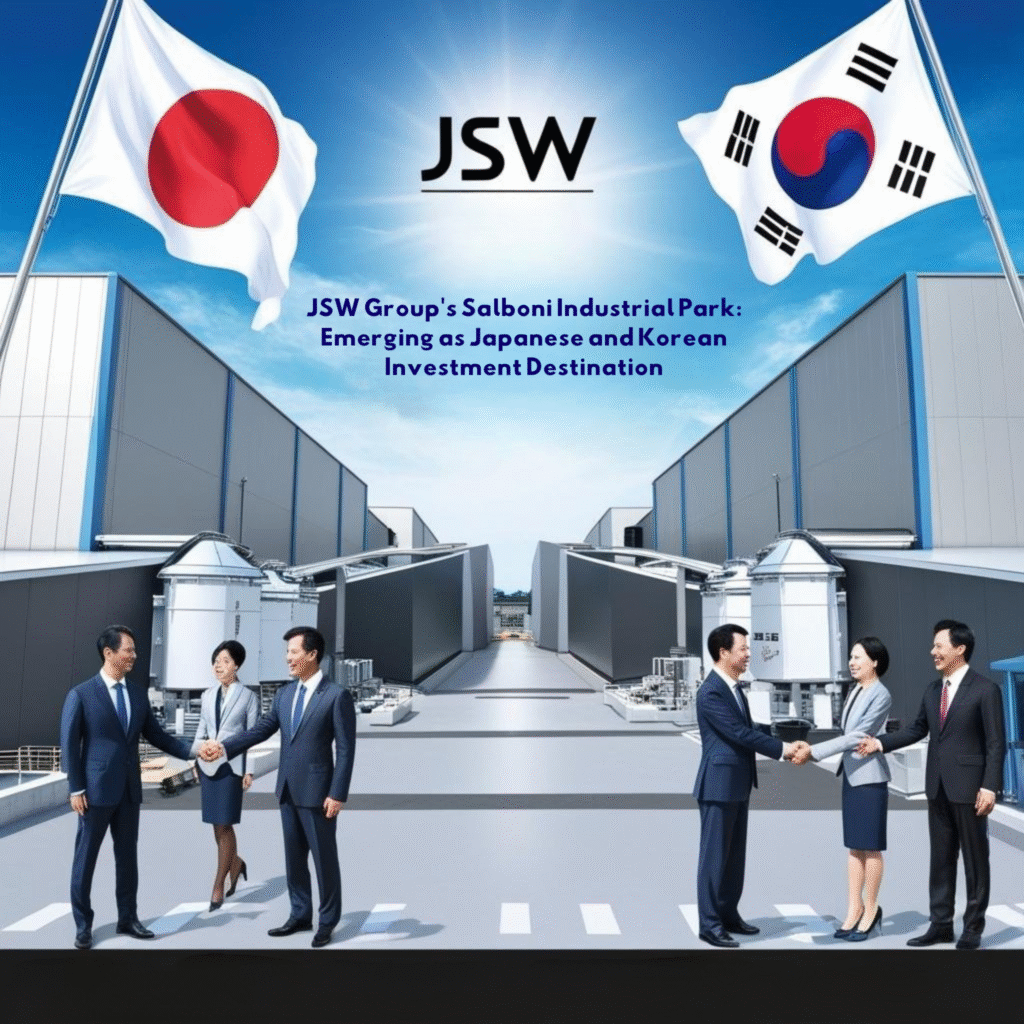
In an ambitious bid to turn West Bengal into an international manufacturing hub, JSW Group is looking to attract Japanese and Korean firms to establish units at its planned Salboni industrial park in Paschim Medinipur.
Declaring on April 21, 2025, at the foundation stone-laying ceremony for the 1,600-MW power plant and industrial park by JSW Group Chairman Sajjan Jindal, the project seeks to leverage changing global trade patterns.
Backed by Chief Minister Mamata Banerjee, the Salboni project has the potential to increase employment, foreign investment, and economic growth in eastern India.
The 2,000-acre Salboni industrial park is meant to draw businesses in electronics, chemicals, refrigerators, transformers, and cell phone batteries.
The current US-China tariff wars have been cited by Jindal as a prime opportunity, given that numerous Japanese and Korean companies, especially those shipping to the US, are looking for alternative bases outside China.
“Returning to their home bases in Japan and Korea is not an option for most of these companies. We want to reach out to them, and we have a pretty good shot at bringing them here,” Jindal said.
This move is in alignment with India’s Make in India program, which promotes foreign investment to decrease dependency on imports. By providing plug-and-play amenities and discounted power, the Salboni park will ensure relocation is easy for international companies.
The project will generate more than 2,000 direct and indirect employment opportunities, promoting local economies in West Bengal and elsewhere.
JSW Group has a strong legacy in Salboni, with 3,500 acres of land under its possession in the area. The group’s saga started from a 10-million-tonne steel plant proposal in 2008, which got stalled owing to raw material deficiencies.
Notwithstanding, JSW was able to commission a 2.4-million-tonne-per-annum (MTPA) cement facility in 2018, subsequently increasing its capacity to 3.6 MTPA at an investment of Rs 400 crore.
The cement division, which was opened by Chief Minister Mamata Banerjee, manufactures environmentally friendly Portland Slag Cement for markets in West Bengal, Bihar, Jharkhand, and Odisha.
On April 21, 2025, Banerjee laid the foundation stone of a 1,600-MW ultra super-critical power unit, in which JSW Energy is investing Rs 16,000 crore.
Jindal also declared intentions for two more 800-MW power units as well as a skill development centre in response to a request from the state to train local youths.
With Coal India linkage and a power purchase agreement with West Bengal State Electricity Distribution Company Limited (WBSEDCL), the power project guarantees energy reliability for the industrial park.
Japanese and Korean companies specialize in high-tech manufacturing, especially in electronics and auto components. Samsung, LG, and Panasonic have already made a foothold in India, attracted by its expanding market and cheap labor.
Salboni’s proximity to Kolkata’s ports and its integration with the Amritsar-Kolkata Industrial Corridor make it an attractive location for export-oriented businesses.
The industrial park’s plug-and-play infrastructure—pre-built facilities, utilities, and logistics support—reduces setup time and costs for foreign investors. JSW’s focus on sustainability, seen in its eco-friendly cement production, also appeals to global firms facing pressure to meet environmental standards.
West Bengal is becoming a major industrial hub, with investments of Rs 1,000 crore cleared in 2025 and five big firms establishing themselves in Raghunathpur’s industrial complex.
Banerjee highlighted the shift in the state from a “load-shedding state” to one that enjoys 24/7 power supply, attributing it to better infrastructure and solidarity. “The synergy committee sanctioned Rs 1,000 crore in the past 15 days,” she said, while pointing out Bengal’s friendly business climate.
JSW’s Salboni project adds to these initiatives. The skill development centre will educate local youth, solving the region’s 70% unskilled workforce issue. By providing employment and creating sustainable industries, the industrial park aids West Bengal’s vision of leading eastern India’s economic development.
Though the Salboni project is hugely promising, there are still challenges. Previous challenges, such as the then-abandoned steel plant owing to iron ore and coal shortages, indicate the necessity of safe raw material linkages.
Locals who lost land for JSW’s projects, to the tune of 4,334 acres, have complained about broken job promises. In 2017, 300 out of 488 jobs promised were given, leading to agitations. Community outreach is a priority that JSW has to undertake for inclusive growth.
On the opportunity side, India’s manufacturing sector is projected to reach USD 1 trillion by 2025-26, driven by policies like the Production Linked Incentive (PLI) scheme. Salboni’s industrial park can tap into this growth, especially as global firms diversify supply chains amid US-China tensions.
JSW Group’s vision for Salboni is a testament to India’s rising industrial ambitions. By attracting Japanese and Korean companies, the industrial park could position West Bengal as a hub for high-tech manufacturing, creating thousands of jobs and boosting exports.
The 1,600-MW power plant and skill development centre further strengthen Salboni’s appeal, ensuring energy and talent for incoming firms.
As India targets a USD 5 trillion economy, schemes like Salboni are paramount. With the backing of the government and JSW, the industrial park is poised to revolutionize the area. For entrepreneurs and job hunters, Salboni is a name to remember.
